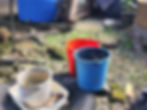Our Clean Water Project in Rural Sabah, Malaysia: A Path to Sustainable Change
- public relations
- Jun 1, 2025
- 3 min read
Updated: Jan 26
We built a gravity-fed water system with more than 200 km of HDPE pipelines, serving over 50,000 people across 40+ kampungs in rural Sabah. Since 2016, this project has solved water access issues, giving villagers safe drinking water every day.
This isn’t just about pipelines—it’s a long-term solution that improves health, hygiene, and quality of life, creating real and lasting change for the communities.
Gravity Water System Impact for Clean Water:
200+ km of HDPE pipeline installed
Safe water provided for 50,000+ people since 2016
Improving health, hygiene, and quality of life
Partner with Hope Malaysia to support sustainable projects like this and create real impact in local communities.
The Flow of Sabah's Rural Vs. Urban Life. Can You Survive Without Clean Water?
Water is the basis of all life. Without water, nothing in this world can be sustained. For most of us, clean water is an afterthought—a tap turned on, a bottle bought, no questions asked.

But imagine if this convenience disappeared overnight. Could you survive without clean water?
For many rural communities in Sabah, this isn’t a hypothetical question. It’s a harsh reality they face daily.
Could You Survive Without Clean Water in Rural Sabah?
In urban Malaysia, clean water is effortless. It flows freely from taps, ready for drinking, cooking, or washing at any moment. It’s also easy to buy bottled water if needed, without worrying about an adverse impact to travel or finances in doing so. This ease supports public health, education, and economic activity, forming the foundation of everyday modern city living.
But in rural Sabah, the story couldn't be more different. For thousands of families, clean water is a rare privilege, not a guarantee. These communities are disconnected from Sabah’s public water supply, left to fend for themselves with old, damaged systems, rainwater collection (if it rains), or rivers that are unsafe for consumption.
The Daily Struggle for Survival
Imagine walking miles to fetch water every day. Heavy buckets in hand, the journey back is exhausting, the water often questionable at best. Yet, this is the norm for countless rural Sabahans.

Without access to clean water:
Health deteriorates. Unsafe water leads to diseases that are easily preventable.
Education suffers. Children miss school to help their families collect water.
Livelihoods are trapped. Farming and economic opportunities dwindle without reliable water sources.
While cities thrive, these rural communities remain stuck in a cycle of poverty.
Why Clean Water Is the First Step to Change
Addressing water insecurity is more than providing a necessity—it’s about restoring dignity and hope. Clean water:
Keeps families healthy and free from waterborne diseases.
Allows children to focus on their education instead of water collection.
Supports farming, creating food security and income opportunities.
This is where we come in. At Hopes Malaysia, we’re dedicated to bringing sustainable, gravity-fed water systems to rural families in Sabah. These systems provide reliable, safe water for generations, transforming lives in meaningful, lasting ways.
Overcoming this grave issue for rural Sabahans takes effort and commitment in ensuring their clean water needs are sustainably met for generations to come. Rural livelihoods can only be improved once clean water is no longer a worry!
How You Can Make a Difference
You can help close the gap between rural and urban life. Here’s how:
Donate: Small monthly donations have a big impact. Help us bring clean water to more families.
Partner with us: Align your CSR efforts with a cause that directly changes lives.
Learn More: Visit our campaign page to discover how we’re making clean water accessible for Sabah’s rural communities.
Clean Water: A Basic Right, Not a Luxury

This isn’t about adding convenience—it’s about survival. Together, we can empower rural Sabahans to thrive, not just scrape by.
Your support could be the turning point for a family, a community, a generation. Let’s bridge the divide and bring clean water to those who need it most.











